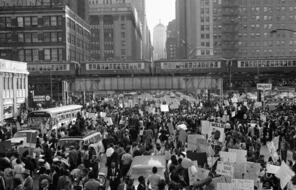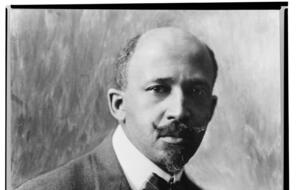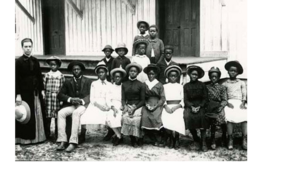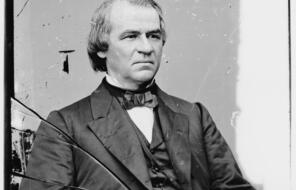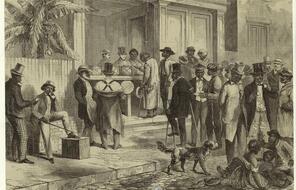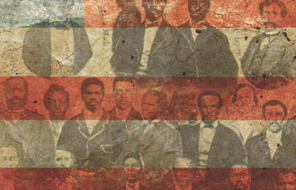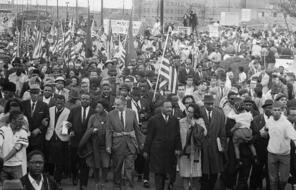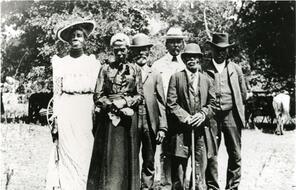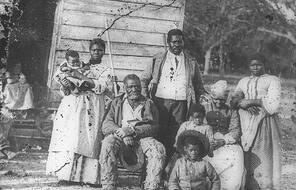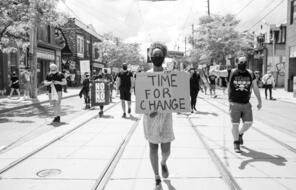Freedpeople Protest the Loss of Their Land
At a Glance
Subject
- History
- Racism
- Human & Civil Rights
- Racism
In January 1865, General Sherman acted on the testimony of the freedpeople of Savannah, Georgia by issuing Special Field Order 15. The field order divided up land abandoned by Southern planters along the coasts of South Carolina, Georgia, and Florida and gave it to freedpeople in 40-acre plots. Under President Johnson’s Reconstruction policies, most of that land was taken from the freedpeople and returned to its original owners later that year. The following is a letter from the Committee of Freedmen on Edisto Island, South Carolina, to Freedmen’s Bureau Commissioner O.O. Howard responding to Johnson’s land policy.
[Edisto Island, S.C., October 20 or 21, 1865]
General It Is with painfull Hearts that we the committe address you, we Have thorougholy considered the order which you wished us to Sighn, we wish we could do so but cannot feel ourrights Safe If we do so,
General we want Homestead’s; we were promised Homestead’s by the government, If It does not carry out the promises Its agents made to us, If the government Haveing concluded to befriend Its late enemies and to neglect to observe the principles of common faith between Its self and us Its allies In the war you said was over, now takes away from them all right to the soil they stand upon save such as they can get by again working for your late and thier all time ememies.—If the government does so we are left In a more unpleasant condition than our former
we are at the mercy of those who are combined to prevent us from getting land enough to lay our Fathers bones upon. We Have property In Horses, cattle, carriages, & articles of furniture, but we are landless and Homeless, from the Homes we Have lived In In the past we can only do one of three things Step Into the public road or the sea or remain on them working as In former time and subject to thire will as then. We can not resist It In any way without being driven out Homeless upon the road.
You will see this Is not the condition of really freemen
You ask us to forgive the land owners of our Island, You only lost your right arm. In war and might forgive them. The man who tied me to a tree & gave me 39 lashes & who stripped and flogged my mother & my sister & who will not let me stay In His empty Hut except I will do His planting & be Satisfied with His price & who combines with others to keep away land from me well knowing I would not Have any thing to do with Him If I Had land of my own.—that man, I cannot well forgive. Does It look as If He Has forgiven me, seeing How He tries to keep me In a condition of Helplessness
General, we cannot remain Here In such condition and If the government permits them to come back we ask It to Help us to reach land where we shall not be slaves nor compelled to work for those who would treat us as such
we Have not been treacherous, we Have not for selfish motives allied to us those who suffered like us from a common enemy & then Haveing gained our purpose left our allies In thier Hands There Is no rights secured to us there Is no law likely to be made which our Hands can reach. The state will make laws that we shall not be able to Hold land even If we pay for It Landless, Homeless. Voteless. we can only pray to god & Hope for His Help, your Infuence & assistance With consideration of esteem your
Obt Servts
In behalf of the peopleHenry
Bram Committe Ishmael
Moultrie
yates Sampson 1
- 1Published in Stephen Hahn et al., eds., Land and Labor, 1865 (Freedom: A Documentary History of Emancipation, 1861–1867, Series 3, vol. 1) (University of North Carolina Press, 2008).
How to Cite This Reading
Facing History & Ourselves, "Freedpeople Protest the Loss of Their Land," last updated March 14, 2016.
This reading contains text not authored by Facing History & Ourselves. See footnotes for source information.

